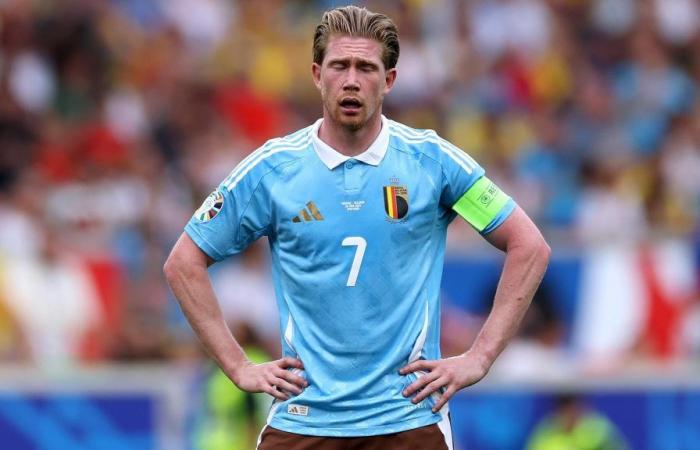There was this pleasant and spectacular opening match. There was also, in the days that followed, a string of frankly pleasing goals, so much so that we could, from the first week, establish a nice Top 10 of the most beautiful achievements of this competition. In short, there was enthusiasm, and the desire to believe that national football could resist everything, forever. Now that the group stage is (finally) behind us, there remains that little bitter taste. And, again, a touch of worry.
From a strictly footballing point of view, this Euro 2024 is, for the moment, distressingly poor but certainly not surprising. There, before our eyes, is written the result of different trends more or less chosen, more or less anticipated, but almost always guided by bad reasons.
The first observation is also the most obvious: the players are exhausted. They are the ones who say it – Antoine Griezmann raised the subject at a press conference – and it is, mainly, the great football nations who suffer from it. Because their squads are essentially made up of elements playing in the biggest championships, and in clubs competing in the biggest competitions until the end, the Euro is, for them, an indigestible supplement.
The Euro at 24 and the race to the bottom
It shouldn’t be just that, but that’s what the highest football authorities have decided. With completely overloaded schedules, pre-competition preparations are no longer really there. The Blues, for example, only had ten days to prepare for the meeting and three were fully devoted to vigorous physical preparation to try to remedy the irremediable situation.
“The main problem for the Blues is that Giroud and Griezmann are out of their depth”
So much the better for the outsiders or the little thumbs, some will say, without seeing that this is a leveling down. Let us remember, moreover, that the presence of some of these teams is only due to an expansion of the Euro, from 16 to 24 participants since the 2016 edition with the sole aim of generating more matches, therefore more advertising and broadcasting revenue for UEFA.
These nations have nothing to do with it and there is certainly no question of reproaching them for their presence. Nor even the weapons with which they fight: schematically, low blocks closed with double or triple towers while waiting for faults to proceed against them. While knowing that with the current format, three draws in the group stage can be enough to reach the eighth.
Let’s be clear: the recipe is as old as time, it exists, and that’s good, since it remains the best way to shake up, or even overthrow, giants. But unlike the big clubs, the big nations simply no longer have the time to find the solution, or to put in place the various tactical mechanisms needed to get around the problem.
No more difficulty in shooting…
This is pushing us towards a sterilization of the game, as Arsène Wenger, head of football development at FIFA, observed half-heartedly in the middle of the World Cup in Qatar: “the teams block the center of the field and open up a little more on the sides“. “We see a trend where the compactness of all teams in a defensive setup is so focused on the midfield that it is really very difficult for teams to break through the middle and shoot on goal from 20 or 25 yards“, added Jurgen Klinsmann, then a member of the body’s technical study group.
Group management, communications, choice of men: Is Deschamps’ armor cracking?
Direct consequence: the favorites shoot “worse”. England only scored 34.5% of their shots. Portugal ? 30.2%. Blues ? 27.7%. In this little game, it is Austria, Switzerland, the Czech Republic, Romania and Croatia which form the Top 5, with rates close to or above 40 or even 50%. Not a coincidence.
Added to this is a tendency which cannot really be attributed to the authorities, but rather to the idealization of a single way of playing. Almost everywhere in Europe, guardiolism has given rise to an obsession with possession, without this ingredient unfortunately being accompanied by all those which have also made the success of the Spanish coach.
…and dribbling
Here too, the observation had already been made during the previous major tournament: “In Europe there has been a trend over the last ten years to educate our young players according to a very quick, one or two touch philosophyobserved Klinsmann. Move the ball quickly, get away from it and maintain possession. All these objectives take away a little from the players’ ability to face one on one.”
And since the game now takes place on the wings, we are witnessing a form of unproductivity on the part of the strongest nations. Throughout Euro 2021, only three teams completed less than half of the dribbles they attempted (Hungary, Slovakia and… Germany). Since the start of Euro 2024, only four teams have completed more than half of the dribbles they have attempted (Ukraine, Croatia, Italy, Serbia). Provoking no longer pays.
During the group stage, a third of the goals were scored from set pieces (and after certain penalties generously awarded by the VAR) as well as by opposing defenders pushed into error by the siege of their area
So, is the Euro still worth watching? Yes, and for at least two reasons. Firstly because the start of the round of 16 also marks the end of the little grocery calculations. Then because football is, fortunately, not just about the game but also about passion, twists and turns and emotions. And on these plans, France, which experienced the greatest final in the history of the World Cup after 60 minutes of nothingness, and Georgia, heroic against Portugal on Wednesday evening to reach the round of 16 for the first time , are in the same boat.
Is Mbappé in the right place? “France needs him on the left”






